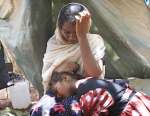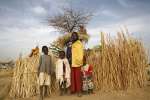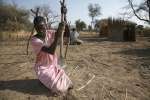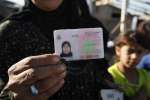Syrian refugee women fight for survival as they head families alone
News Stories, 8 July 2014
AMMAN, Jordan, July 8 (UNHCR) – More than 145,000 Syrian refugee families in Egypt, Lebanon, Iraq and Jordan – or one in four of all households – are headed by women facing a lone fight for survival, a new UNHCR report reveals today.
The report lifts the veil on a daily struggle to make ends meet, as the women battle to maintain their dignity and care for their families in run-down, overcrowded homes, insecure makeshift shelters and tents. Many live under the threat of violence or exploitation, and their children face mounting trauma and distress.
Woman Alone: The Fight for Survival by Syria's Refugee Women is based on the personal testimony of 135 of those women, given over three months of interviews in early 2014. Forced to take responsibility for their families after their men were killed, captured or otherwise separated, they are caught in a spiral of hardship, isolation and anxiety.
The main difficulty cited was a lack of resources. Most of the women are struggling to pay the rent, put food on the table and buy basic household items. Many have reached the end of their savings – even selling off their wedding rings. Only one fifth have paid work; many find it hard to get a job, or have too much else on their plate. Only one fifth receive support from other adult relatives.
Some women benefit from the generosity of local mosques, or landlords who let them stay rent-free. Some send their children to work. A quarter receive cash assistance from UNHCR and other aid agencies; two thirds of those who got assistance are entirely dependent on it. A third of the women say they do not have enough to eat.
UNHCR called for urgent new action from donors, host governments and aid agencies.
"For hundreds of thousands of women, escaping their ruined homeland was only the first step in a journey of grinding hardship," said António Guterres, UN High Commissioner for Refugees. "They have run out of money, face daily threats to their safety and are being treated as outcasts for no other crime than losing their men to a vicious war. It's shameful. They are being humiliated for losing everything."
Angelina Jolie, UNHCR's Special Envoy, added: "Syrian refugee women are the glue holding together a broken society. Their strength is extraordinary, but they are struggling alone. Their voices are an appeal for help and protection which cannot be ignored."
Life in exile for these women has meant becoming the main breadwinner and caregiver, fending for themselves and their families, away from their communities and traditional sources of support. For most, the burden is overwhelming, and many are entirely dependent on outside assistance.
Sixty per cent of the women interviewed expressed feelings of insecurity, and one in three were too scared or overwhelmed to leave their homes. Nuha came to Cairo with her husband, but he was shot and killed while at work. "I don't want to leave the house because of the sadness in my heart," she said. "We left death in Syria only to find it waiting for us here in Egypt."
Many women complained of regular verbal harassment – by taxi drivers, bus drivers, landlords, and service providers, as well as men in shops, at the market, on public transport and even at aid distributions.
"A woman alone in Egypt is prey to all men," said Diala, who lives in Alexandria, Egypt. Zahwa, in Jordan, says she was even harassed by refugees when collecting food coupons. "I was living in dignity, but now no one respects me because I'm not with a man," she said.
One woman reported being raped, but many were not prepared to discuss sexual and gender-based violence. "I would never turn to an organisation for help," said Noor, a refugee in Lebanon. "I would put salt on the wound and stay quiet, but I'd never ever say anything to anyone."
Most of the women were concerned about the impact on their children. "I have to worry about the finances and school. I have to protect them, provide for them, and give them a mother's love all at the same time. I feel pummelled," said Dina, in Egypt.
Over 150 organisations are providing services or support to Syrian refugee women and their families. The research found many examples of refugee women taking the initiative, supporting each other and working to find solutions to their daily struggle. It also highlighted many acts of kindness and generosity by host countries and communities.
But the report concluded that this assistance fell short of what was needed and called on donors to do more to help Syrian refugee women get back on their feet and earn enough money to live. With visa or other restrictions separating one in five of the women from their husbands or families, the report also asked host governments to find solutions to reunite them with their families. Host communities also need massive support. Many of these women's difficulties – and rising tensions – reflect more general concerns in the communities around them.
Syria, which has produced 2.9 million refugees and seen millions more internally displaced, has become the world's largest displacement crisis. Since the start of 2014, more than 100,000 Syrian refugees have registered in neighbouring countries every month. The total number of refugees is expected to reach 3.6 million by the end of the year.
The report can be found here: http://womanalone.unhcr.org/mobile/










































